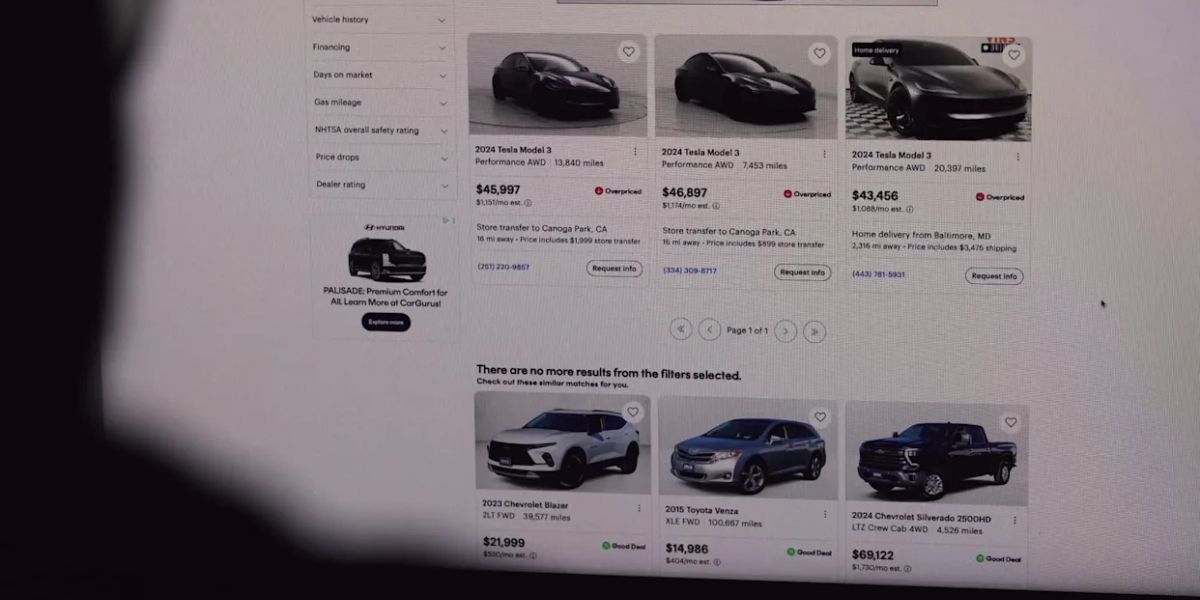Orange County, CA — Buying a car online can save money, but new reports show that artificial intelligence (AI) is making auto fraud more sophisticated and widespread than ever before. A recent investigation reveals that unsuspecting car buyers are increasingly falling victim to AI-generated scams on online marketplaces such as Facebook.
According to a report from AuthenticID, nearly 5% of all automotive transactions in the U.S. were fraudulent in 2024 — a staggering number highlighting the growing role of AI in identity theft and fake listings.
The Arrest That Sparked an Investigation
Eighteen-year-old Andrew Arenas of Orange County had no idea his dream car would lead to one of the most traumatic experiences of his life.
After buying a used car for $4,500 on Facebook Marketplace, Arenas invested thousands more in repairs and upgrades. But in January 2024, when he pulled up to his parents’ home, law enforcement officers ordered him face down on the pavement at gunpoint.
“This is my first time in my life ever being handcuffed, and I hope for it to be the last,” Arenas told CBS News.
Officers told him the car had been reported stolen — even though Arenas had the title, registration, and DMV paperwork to prove ownership.
“I remember looking at them and thinking, ‘I’m sorry, this doesn’t seem right.’ Just complete confusion,” he said.
Despite the ordeal, the Facebook Marketplace listing for his vehicle remained active, according to CBS News California Investigates.
How AI Is Fueling Online Auto Scams
Consumer advocate Rosemary Shahan said scams have evolved far beyond traditional fake listings.
“AI, I think, takes it to a whole new level,” she warned.
AI tools can now be used to create fake car titles, forged registration documents, and stolen VINs that appear authentic — making it harder for even experienced buyers to detect fraud.
Shahan expressed concern when shown how AI can replicate state-issued pink slips.
“That is a very scary concept that you could even get a car with a pink slip, with a title, and it’s not legit,” she said.
Legal Debate and Marketplace Responsibility
The CBS investigation also revealed that tech companies face mounting criticism for not doing enough to protect users. Paul Taske, an attorney for NetChoice, which represents major tech platforms, said online marketplaces are facing complex legal challenges.
NetChoice successfully sued California to block a law requiring online marketplaces to verify high-volume sellers — a measure designed to curb stolen product listings.
When CBS reached out to Meta, the parent company of Facebook, about stolen car listings, the company said users are encouraged to report suspicious behavior and that they offer purchase protection on select items.
However, CBS discovered a major caveat.
“Vehicles are not included under Meta’s purchase protection policy,” the investigation found.
How Consumers Can Protect Themselves
Experts recommend car buyers take several steps to reduce their risk of being scammed online:
- Verify the VIN with Carfax or the National Insurance Crime Bureau (NICB) before purchasing.
- Meet sellers in public places and confirm their identity through ID and registration.
- Avoid paying in cash or through peer-to-peer apps unless the seller is verified.
- Check for inconsistencies between the title, seller’s name, and vehicle details.
- Be skeptical of deals that seem “too good to be true.”
“AI-generated scams are becoming nearly impossible to detect with the naked eye,” said cybersecurity expert Aaron Rose. “Awareness is the first line of defense.”
A Growing Threat for Online Buyers
Authorities say AI-driven fraud is quickly becoming one of the most serious threats in the used car market. As online listings multiply, the challenge for consumers — and platforms — is ensuring authenticity in an era of digital deception.
What are your thoughts on this growing issue and how tech companies can better protect consumers? Share your views in the comments below.





